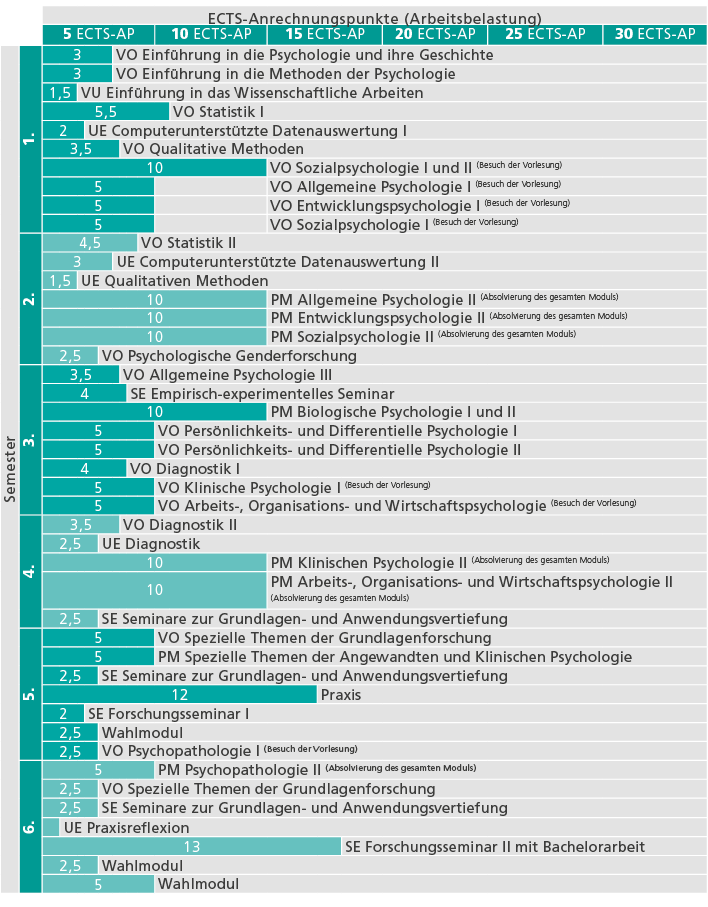Bachelorstudium Psychologie
Curriculum (2019W)
Bachelor of Science (BSc)
Dauer / ECTS-AP
6 Semester / 180 ECTS-AP
Studienart
Vollzeit
Sprache
Deutsch
Voraussetzung
Matura oder Äquivalent und Sprachnachweis
Fakultät
Fakultät für Psychologie und Sportwissenschaft
Niveau der Qualifikation
Bachelor (1. Studienzyklus)
ISCED-11: Stufe 6, EQR/NQR: Stufe 6
ISCED-F
0313 Psychologie
Studienkennzahl
UC 033 640
Das Curriculum ist die Grundlage eines Studiums. Mit einem Blick auf das Curriculum zum Bachelor Psychologie erhältst du einen detaillierten Überblick zu Aufbau, Inhalt, Prüfungsordnung und Qualifikationsprofil dieses Bachelors.
Durch das Curriculum können mehrere wichtige Fragen bereits vor Studienbeginn geklärt werden. Zum Beispiel welche Kriterien für die Anmeldung zum Bachelor Psychologie erfüllt werden müssen, wie lange das Studium dauert, welche Module zu absolvieren sind und vieles mehr.
Für das Bachelorstudium Psychologie gilt aktuell das Curriculum 2019W.
Informationen zum Curriculum (2019W)
Die rechtlich verbindliche Form des Curriculums inkl. etwaiger Änderungen finden Sie in den entsprechenden Mitteilungsblättern.
Die Information, welche Curriculumsversion für Sie gilt, entnehmen Sie bitte Ihrem Studienblatt
abrufbar unter: https://lfuonline.uibk.ac.at/public/lfuonline_meinestudien.studienblatt
Spalte: Curriculum in der geltenden Fassung
- Mitteilungsblatt vom 17.06.2021, 79. Stück. Nr. 879 (Festlegung der allgemeinen Zulassungsfrist für das Wintersemester 2021/2022)
- Mitteilungsblatt vom 23.07.2020, 44. Stück, Nr. 496 (Änderung des Aufnahmeverfahrens 2020/2021)
- Mitteilungsblatt vom 17.10.2019, 4. Stück, Nr. 51 (Äquivalenzliste)
- Mitteilungsblatt vom 05.06.2019, 56. Stück, Nr. 491 (Festlegung der allgemeinen Zulassungsfrist)
- Mitteilungsblatt vom 09.04.2019, 35. Stück, Nr. 385 (Curriculum)
Empfohlener Studienverlauf
Der unten angeführte, exemplarische Studienverlauf gilt als Empfehlung für Vollzeitstudierende, die das Studium im Wintersemester beginnen. Die Aufstellung dient der Darstellung eines möglichen Studienablaufs und ist nicht verpflichtend. Etwaige Prüfungswiederholungen bzw. deren studienzeitverzögernde Wirkung sind nicht berücksichtigt.
Die Regelstudienzeit beträgt 6 Semester bzw. 180 ECTS-AP, wobei gemäß Universitätsgesetz die Arbeitsbelastung eines Studienjahres 1.500 (Echt-)Stunden zu betragen hat und dieser Arbeitsbelastung 60 Anrechnungspunkte zugeteilt werden (ein ECTS-Anrechnungspunkt entspricht einer Arbeitsbelastung der Studierenden von 25 Stunden).
3,0 ECTS-AP: VO Einführung in die Psychologie und ihre Geschichte
3,0 ECTS-AP: VO Einführung in die Methoden der Psychologie
1,5 ECTS-AP: VU Einführung in das Wissenschaftliche Arbeiten
5,5 ECTS-AP: VO Statistik I
2,0 ECTS-AP: UE Computerunterstützte Datenauswertung I
3,5 ECTS-AP: VO Qualitative Methoden
5,0 ECTS-AP: VO Sozialpsychologie I (Besuch der Vorlesung)
5,0 ECTS-AP: VO Allgemeine Psychologie I (Besuch der Vorlesung)
5,0 ECTS-AP: VO Entwicklungspsychologie I (Besuch der Vorlesung)
4,5 ECTS-AP: VO Statistik II
3,0 ECTS-AP: UE Computerunterstützte Datenauswertung II
1,5 ECTS-AP: UE Qualitativen Methoden
10,0 ECTS-AP: PM Allgemeine Psychologie II (Absolvierung des gesamten Moduls)
10,0 ECTS-AP: PM Entwicklungspsychologie II (Absolvierung des gesamten Moduls)
10,0 ECTS-AP: PM Sozialpsychologie II (Absolvierung des gesamten Moduls)
2,5 ECTS-AP: VO Psychologische Genderforschung
3,5 ECTS-AP: VO Allgemeine Psychologie III
4,0 ECTS-AP: SE Empirisch-experimentelles Seminar
10,0 ECTS-AP: PM Biologische Psychologie I und II
5,0 ECTS-AP: VO Persönlichkeits- und Differentielle Psychologie I
5,0 ECTS-AP: VO Persönlichkeits- und Differentielle Psychologie II
4,0 ECTS-AP: VO Diagnostik I
5,0 ECTS-AP: VO Klinische Psychologie I (Besuch der Vorlesung)
5,0 ECTS-AP: VO Arbeits-, Organisations- und Wirtschaftspsychologie (Besuch der Vorlesung)
3,5 ECTS-AP: VO Diagnostik II
2,5 ECTS-AP: UE Diagnostik
10,0 ECTS-AP: PM Klinischen Psychologie II (Absolvierung des gesamten Moduls)
10,0 ECTS-AP: PM Arbeits-, Organisations- und Wirtschaftspsychologie II (Absolvierung des gesamten Moduls)
2,5 ECTS-AP: SE Seminare zur Grundlagen- und Anwendungsvertiefung
5,0 ECTS-AP: VO Spezielle Themen der Grundlagenforschung
5,0 ECTS-AP: PM Spezielle Themen der Angewandten und Klinischen Psychologie
2,5 ECTS-AP: SE Seminare zur Grundlagen- und Anwendungsvertiefung
12,0 ECTS-AP: Praxis
2,0 ECTS-AP: SE Forschungsseminar I
2,5 ECTS-AP: Wahlmodul
2,5 ECTS-AP: VO Psychopathologie I (Besuch der Vorlesung)
5,0 ECTS-AP: PM Psychopathologie II (Absolvierung des gesamten Moduls)
2,5 ECTS-AP: VO Spezielle Themen der Grundlagenforschung
2,5 ECTS-AP: SE Seminare zur Grundlagen- und Anwendungsvertiefung
0,5 ECTS-AP: UE Praxisreflexion
13,0 ECTS-AP: SE Forschungsseminar II mit Bachelorarbeit
2,5 ECTS-AP: Wahlmodul
5,0 ECTS-AP: Wahlmodul

| Semester | ECTS-AP | Titel |
|---|---|---|
Erweiterung des Studiums
Im Rahmen dieses Studiums kann das Erweiterungsstudium Informatik im Umfang von 60 ECTS-AP absolviert werden. Die Zulassung zur Erweiterung setzt die Zulassung zu einem oder den bereits erfolgten Abschluss eines ausgewählten Studiums voraus. Weitere Informationen sind abrufbar unter: https://www.uibk.ac.at/studium/angebot/es-informatik/index.html.de
Informationen zur Prüfungsordnung inkl. Bewertung und Benotung
Prüfungsordnung
Die Prüfungsordnung ist integraler Bestandteil des Curriculums, detaillierte Informationen finden Sie unter dem Paragrafen Prüfungsordnung.
Bei der Notenverteilungsskala handelt es sich um die statistische Darstellung der Verteilung aller positiv absolvierten Prüfungen, die innerhalb eines Studiums bzw. eines Studienfaches (unter Heranziehung aller gemeldeten Studierenden eines Studiums bzw. eines Studienfaches) erfasst wurden. Die Notenverteilungsskala wird in regelmäßigen Abständen aktualisiert.
| Österreichische Notenskala | Definition | %-Satz | ||
| 1 | SEHR GUT | 39,5 | = 100% | |
| 2 | GUT | 30,1 | ||
| 3 | BEFRIEDIGEND | 19,5 | ||
| 4 | GENÜGEND | 10,9 | ||
| 5 | NICHT GENÜGEND |
März 2025
Gesamtbeurteilung der Qualifikation
Nicht zutreffend
Erklärung: Eine Gesamtbeurteilung (mit Auszeichnung bestanden, bestanden, nicht bestanden) wird nur über eine studienabschließende Prüfung, die aus mehr als einem Fach besteht, vergeben (im Curriculum dieses Studiums ist diese nicht vorgesehen).
Formulare
- Nachweis über die Bachelorarbeit gemäß Curriculum
- Prüfungsprotokoll
Hinweis: Nach positiver Absolvierung der letzten Prüfung des Bachelorstudiums sind das ausgefüllte "Prüfungsprotokoll" sowie der "Nachweis über die Bachelorarbeit gemäß Curriculum" im Prüfungsreferat einzureichen. - Ansuchen um Anerkennung von PrüfungenUND Beiblatt
- Antrag um Zulassung zur dritten und vierten Wiederholung einer Lehrveranstaltungsprüfung
Kontakt und Information
Prüfungsreferat
Standort Innrain 52d
Studienbeauftragte (Anerkennungen)
Mag. Dr. Christine Unterrainer
und
OR Mag. Dietmar Kratzer (ab 01.03.2024)
Studiendekan (ab 01.03.2024)
Ass.-Prof. Mag. Dr. Michael Barth, Bakk. MSc
Studienbeginn
Telefon: +43 512 507-56006
E-Mail: anerkennungen-psychologie@uibk.ac.at
Aufnahmeverfahren
Telefon: +43 512 507-37008
E-Mail: aufnahmeverfahren@uibk.ac.at
